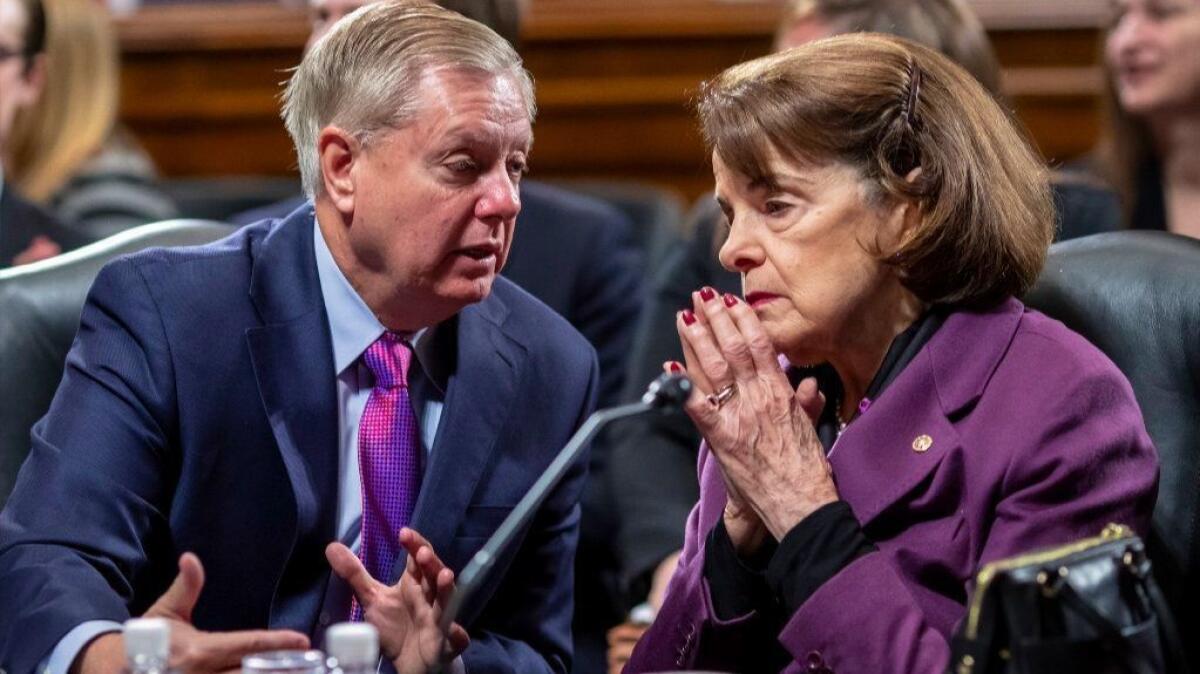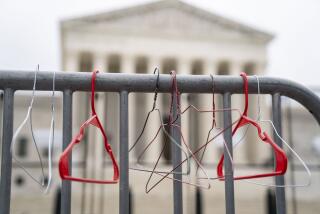California Sens. Feinstein and Harris oppose Trump’s 9th Circuit nominees

Reporting from Washington — California Sens. Dianne Feinstein and Kamala Harris are vowing to fight President Trump’s picks to fill three vacancies on the U.S. 9th Circuit Court of Appeals in California, saying the White House dismissed their objections.
Trump on Wednesday evening tapped Los Angeles appellate attorney Daniel P. Collins, 56, and Los Angeles litigator Kenneth Kiyul Lee, 43, both of whom he had nominated last year. Because they were not confirmed by the end of the last Congress, their nominations had expired.
Trump also nominated Daniel A. Bress, 39, a Washington, D.C.-area partner with Kirkland & Ellis, who was born in California.
The 9th Circuit, which covers California and eight other western states, has handed Trump some of his biggest legal losses, and conservatives itching to change its makeup have been surprised that Trump has left the California vacancies open for two years amid his push to fill empty judgeships across the country with young, conservative nominees.
On Tuesday a critical Wall Street Journal editorial questioned if Trump were softening on choosing conservative judges, saying that making any concessions to Feinstein and Harris “would rightly be seen as political weakness.”
Feinstein, the highest ranking Democrat on the Senate Judiciary Committee, and Harris, also a member of the committee, have expressed specific concerns about each of the nominees, all of whom were vetted by the senators’ judicial selection review committees, made up of legal experts, law professors and attorneys in the state.
Their objections to Collins were over issues of “his temperament and rigidity,” the senators said in a statement.
“We were told that Mr. Collins has a history of taking strong litigation positions for no reason other than attempting to overturn precedent and push legal boundaries. This should be a concern to all senators,” they said.
Collins was counsel for a conservative think tank, the Ethics and Public Policy Center, when it argued in an amicus brief in Sebelius vs. Hobby Lobby that for-profit corporations have religious liberty rights. The Supreme Court agreed in 2014 that the crafts chain had a religious right to refuse to provide certain kinds of birth control coverage as part of its employee benefits despite a federal mandate to do so under Obamacare.
Regarding Lee, the senators complained that he did not turn over “controversial writings” to the review committees when he was being examined. Journalists and Senate staff later uncovered them.
“The writings themselves outlined extreme views on a number of important issues like affirmative action and voting rights,” the senators said.
In 2007, Lee co-authored an article for a Federalist Society publication Engage in which he argued that states should not restore voting rights to felons who have served their time, stating that “society deems felons to be less trustworthy and responsible than non-felon citizens, and those who cannot follow the law should not participate in the passing of laws that govern law-abiding citizens.”
Lee has also written extensively about Asian Americans and affirmative action. In a 1996 New Republic article, Lee wrote that Asian Americans were “caught between” policies that limit their admission to select colleges and “opportunistic conservatives” trying to “woo the Angry Yellow Male vote.” In a 1993 opinion piece in the Orange County Register about affirmative action quotas, he derided schools for teaching “homosexuality, anal sex, and other gobbledygook to children.”
Feinstein and Harris said their objection to Bress is that “he lives in Washington, D.C., not California, is quite young and has no judicial experience.”
Bress was named to fill the 9th Circuit spot Trump had originally tagged for Patrick J. Bumatay, then the assistant U.S. attorney for the Southern District of California. After California’s senators raised concerns about Bumatay’s lack of experience, Trump instead nominated him for a position on the U.S. District Court for the Southern District of California. Neither senator has raised concerns about his nomination to the lower court, nor about the four other California district court nominations Trump made Wednesday.
Historically, U.S. senators have held an informal veto power over a president’s judicial nominees on their home turf. But for the first time, the Trump administration and the GOP-controlled Senate Judiciary Committee have proceeded with confirming nominees even when home-state senators have not returned a so-called blue slip of approval.
Nominations for the California vacancies on the 9th Circuit were held up for most of the past two years as the administration negotiated with Feinstein and Harris. As the ranking member of the Judiciary Committee, Feinstein may have been afforded more deference, at least for a while.
But in October, Lee, Collins and Bumatay were nominated — without warning to Feinstein and Harris. The White House accused Feinstein and Harris of dragging their feet in talks.
Harris said Thursday she would not return her “blue slips” signing off on any of the three new 9th Circuit nominees, as she and Feinstein said they would last year. Harris added that she will oppose all appellate nominees until a “fair process is in place” to pick nominees.
“This administration is packing the court that protected Dreamers from deportation and blocked the unconstitutional transgender military ban. We need nominees who will uphold equality and justice,” Harris said on Twitter.
Feinstein said she is likewise “not inclined” to return her blue slips.
Last year then-Judiciary Committee Chairman Charles E. Grassley (R-Iowa) moved forward on multiple judge nominations despite the objections of their home-state senators. It is not yet clear whether the new chairman, Sen. Lindsey Graham (R-S.C.), will follow Grassley’s lead, or if he’s planning to extend any special deference to Feinstein.
He has scheduled confirmation hearings for other nominees whose home-state senators have not returned blue slips, and he praised Trump’s selections in a statement Thursday saying they are “highly qualified nominees and I am hopeful they will receive wide bipartisan support.”
More stories from Sarah D. Wire »
More to Read
Get the L.A. Times Politics newsletter
Deeply reported insights into legislation, politics and policy from Sacramento, Washington and beyond. In your inbox three times per week.
You may occasionally receive promotional content from the Los Angeles Times.











